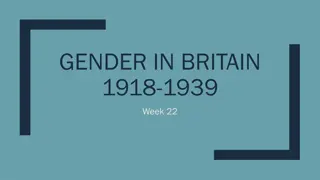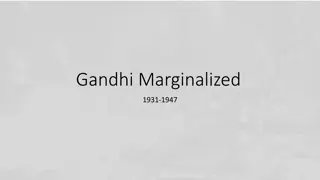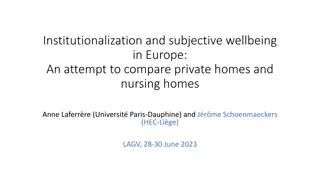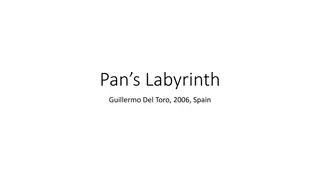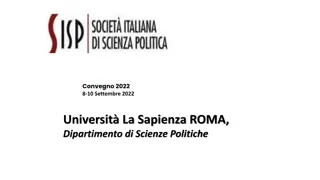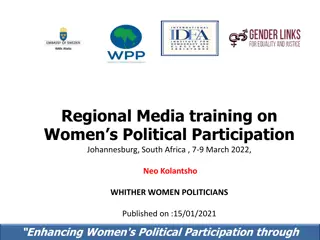Institutionalization of Politics in Service Delivery: A Thought-provoking Analysis
This content delves into the institutionalization of politics in service delivery, examining issues of politicization, depoliticization, and the impact on society. Through insightful discussions, it highlights the challenges and complexities faced in ensuring effective service delivery within the political landscape. The author presents a vision for a smart, wise, fair, healthy, and happy society by 2050, emphasizing the importance of transparency, accountability, and good governance.
Download Presentation

Please find below an Image/Link to download the presentation.
The content on the website is provided AS IS for your information and personal use only. It may not be sold, licensed, or shared on other websites without obtaining consent from the author. Download presentation by click this link. If you encounter any issues during the download, it is possible that the publisher has removed the file from their server.
E N D
Presentation Transcript
2018 PNG Update Institutionalization of Politics in Service Delivery in PNG Stephen P Pokawin School of Law The University of PNG 14-15thJune 2018
Content 1. Introduction 2. Setting the Stage 3. Service and Service Deliver 4. Politicization 5. Institutionalization 6. Issue 7. Depoliticization 8. Conclusion
1. Introduction PNG aims to be a smart, wise, fair, healthy and happy society by 2050 Elements: i. Smart - to encourage and reward excellence, innovation and relevance ii. Wise - practice and uphold transparency, accountability and good governance. Making the right decisions. iii. Fair - equitably distribute resources and opportunities. iv. Healthy being spiritually, physically and culturally fit to live together. v. Happy being healthy, wealthy and safe.
2. Setting the Stage i. Within my life time, PNG grew from 3 million to near 8 million people ii. 1 Central Government iii. 22 Sub National Governments iv. 89 District Development Authorities v. 319 Local-level Governments vi. 6 187 Wards vii. People live everywhere
3. Service and Service Delivery i. ii. It remains essentially the same but it varies in form and quality depending on time and space. iii. Service has two components to it. iv. Firstly, service itself. The product that human and human communities enjoy. v. And secondly, service delivery. The vehicle that makes service available for use and enjoyment by humans. The issue of services is as old as human
4. Politicization i. Issue of delivery of services or non delivery of services has become a war cry. ii. Election issues centers on delivery of services. iii. Political leadership is associated with delivery of services. Schools, roads, health, cars, boats, money, leadership, are indicators of services. iv. People say they have no services. Yet they have accesses to schools, roads, aid posts and health centers, banks and post offices to receive monies sent from their family members or friends. v. Those who lack services are often not heard.
5. Institutionalization i. ii. 8 million people live everywhere 22 provinces are presented in Parliament as provincial electorates. iii. Provinces have their own governments led by the provincial member of Parliament who is also Governor, Chairman of the PGA, Chairman of PEC & Chairman of JPPBPC. iv. Each province is divided into districts / open electorates. v. 89 district/open electorates represented by open members in the National Parliament. vi. Each district has a DDA and the DDA Board chaired by the Open Member of Parliament. vii. The districts are divided into 319 LLGs and 6 187 wards. The populations of the villages, wards, local level governments, districts/open electorates and provinces vary greatly.
7. Issue i. Years of politicization of the service delivery systems has resulted in distrust between elected leaders and officers. Elected leaders have become dominant players. Officers are generally marginalized. iii. We hear Ministers calling on government to do something about the area of responsibilities that the Prime Minister had appointed him to be responsible for. iv. The Departmental Heads call on the government to do something about the issues that they have been appointed by the government to perform. v. Who is that government that its representatives call on to do something? vi. This is the pinnacle of institutionalized politics that may lie at the root of ineffective service delivery in many parts of PNG. ii.
8. Depoliticization i. Papua New Guinea is not short of systems, processes, mechanisms, policies, manpower, funding to deliver quality services to its people. ii. It is short on implementation, compliance and ethical practice. iii. For provinces, districts & LLGs, maybe train & deploy more generalist public servants iv. Make planning and plans simpler and implementable.
9. Conclusion i. Service Delivery systems are affected by politics ii. The OLPGLGs defines the elected leader as policy maker and officers as implementers of policies iii. They must work together








